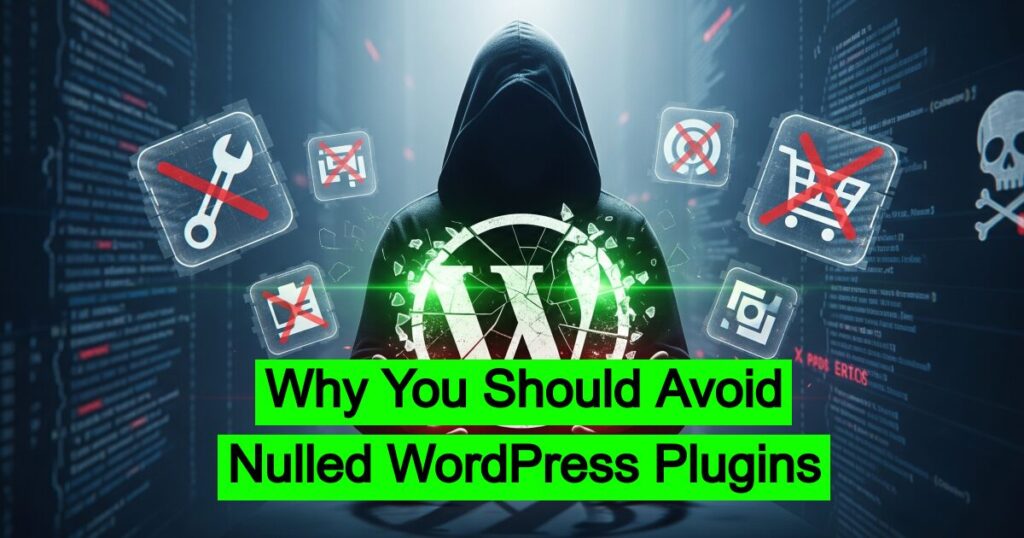In the vast and ever-expanding ecosystem of WordPress, plugins are the lifeblood that transforms a simple website into a powerful, feature-rich platform. They offer functionality ranging from e-commerce capabilities to search engine optimization, and from enhanced security to beautiful photo galleries. The market is saturated with both free and premium options, providing a solution for nearly every conceivable need. However, for every legitimate plugin, a darker, more dangerous alternative lurks in the shadows: the nulled WordPress plugin. In this article, you’ll dive into the deceptive allure of nulled plugins, defining what they are, and meticulously explaining why you should avoid nulled WordPress plugins.
What is a Nulled WordPress Plugin?
A nulled WordPress plugin is a pirated or cracked version of a premium, commercially sold plugin. Developers invest significant time, effort, and resources into creating and maintaining these tools. To protect their intellectual property and ensure they are compensated for their work, they typically implement a licensing system. This system often requires a unique license key for activation, which grants users access to updates, support, and all the features of the plugin.
Nulled plugins bypass this licensing mechanism. They are created by individuals who illegally obtain a premium plugin, remove or “nullify” the code that checks for a valid license, and then distribute it for free or at a significantly reduced price on various illicit websites, forums, and torrent sites. The term “nulled” literally refers to the act of setting the license validation code to a “null” state, effectively tricking the plugin into believing it is a legitimately licensed version.
The appeal is obvious: a free or cheap version of a product that normally costs money. For a small business owner on a tight budget, or a hobbyist developer looking to experiment, the prospect of saving a few dozen or even a few hundred dollars can be incredibly tempting. This initial cost-saving solution could actually result in long-term consequences.
Why You Should Avoid Nulled WordPress Plugins

The risks associated with using nulled plugins are not merely hypothetical; they are very real, very dangerous, and can have catastrophic consequences for your website, your business, and even your personal data.
Security Vulnerabilities: A Trojan Horse for Your Website
This is arguably the most significant and immediate threat posed by nulled plugins. When a plugin is “nulled,” its code is tampered with. The individuals who perform this cracking process are not doing it out of altruism. They often inject malicious code, or malware, into the plugin’s files. This malware can take many forms:
- Backdoors: A backdoor is a secret method of bypassing normal authentication or encryption in a computer system. The nulled plugin can create a hidden backdoor on your website, giving the attacker full administrative access without your knowledge. They can then use this access to deface your site, delete your content, or even take it offline entirely.
- Spam and Phishing: The injected code can be designed to turn your website into a spam bot. It can send out thousands of unsolicited emails, host phishing pages designed to steal user credentials, or redirect your visitors to malicious websites. This not only damages your reputation but can also lead to your domain being blacklisted by search engines and email providers, effectively killing your online presence.
- Malicious Redirects: The nulled plugin can surreptitiously inject code that redirects your users to other websites. This can be used to drive traffic to an attacker’s sites, show them malicious ads, or trick them into downloading viruses.
- Data Theft: The most insidious form of attack is data theft. The malicious code can be designed to steal sensitive information from your website’s database, including customer names, email addresses, phone numbers, and even credit card information if you run an e-commerce store. The legal and financial repercussions of a data breach are immense, not to mention the irreparable damage to customer trust.
The danger is magnified because the malware is often dormant. It might not activate immediately, lying in wait for the perfect moment to strike, or it may only activate when a specific condition is met, making it incredibly difficult to detect. You might be running a nulled plugin for months, blissfully unaware that your website has become a ticking time bomb.
Absence of Updates and Support: A Path to Obsolescence and Vulnerability
Premium plugins are constantly being updated. These updates are crucial for several reasons:
- Bug Fixes: Developers regularly release patches to fix bugs and improve performance.
- New Features: Updates often introduce new features, keeping the plugin relevant and competitive.
- Security Patches: Most importantly, updates address newly discovered security vulnerabilities. When a zero-day exploit is found in a plugin, the developer releases an immediate patch to fix it.
When you use a nulled plugin, you are cut off from this vital update stream. You are stuck with a static, outdated version of the plugin. As new vulnerabilities are discovered and exploited by hackers, your website remains exposed. You have no way of knowing about these vulnerabilities, and even if you did, you would have no legitimate way to patch them. This is a perpetual state of risk.
Additionally, you lose access to customer support. If you encounter a problem or a bug, you have no one to turn to. The developer of the legitimate plugin will not help you because you are not a paying customer. You are left to troubleshoot the issue on your own, which is a daunting task, especially if you lack the technical expertise.
Loss of Functionality and Performance Issues
Nulled plugins are not perfect copies. In the process of nullifying the code, the crackers may inadvertently or intentionally remove key features, scripts, or APIs. This can lead to a range of issues:
- Missing Features: Some functionality may simply not work. A premium e-commerce plugin might not be able to process payments, or a gallery plugin might not be able to connect to its remote image optimization service.
- Broken Scripts: The nullification process can break dependencies or alter the logic of the code, leading to unexpected errors, conflicts with other plugins, or even a complete breakdown of your website.
- Slower Performance: The injected malicious code can consume significant server resources, slowing down your website’s load time. A slow website not only frustrates visitors but also negatively impacts your search engine rankings.
Legal and Ethical Ramifications: Theft and Plagiarism
Using a nulled plugin is a form of software piracy. You are using a product that you have not paid for, thereby stealing from the developer. This is a clear violation of copyright law. While it is rare for individual users to face legal action, it is not outside the realm of possibility, especially for large businesses.
Beyond the legal aspect, there is an ethical dimension. Developers are professionals who deserve to be compensated for their work. They spend countless hours of their lives creating tools that make the internet a better place. By using nulled plugins, you are undermining their work, discouraging them from creating future innovations, and contributing to an ecosystem of theft.
Blacklisting and Reputation Damage
As mentioned earlier, a website running a nulled plugin can be easily compromised and used for malicious activities. When this happens, search engines like Google and Bing will flag your site as dangerous. They will display a prominent warning to anyone who tries to visit it, telling them that the site may contain malware or be used for phishing. This immediate blacklisting will cause your traffic to plummet to zero and your reputation to be irreparably damaged. It’s a difficult and time-consuming process to get your site delisted and regain the trust of both search engines and your audience.
The Alternative: Investing in Your Success By Choosing Premium Plugins
The solution to all these problems is simple and straightforward: pay for the legitimate plugins you need. The cost of a premium plugin is a small investment in the security, stability, and success of your website.
- Peace of Mind: Knowing that your website is secure, regularly updated, and backed by professional support is invaluable. You won’t have to worry about a data breach, a sudden site crash, or being blacklisted.
- Access to Support: If you run into any issues, you can contact the developer’s support team. They are experts in their product and can help you resolve any problem quickly and efficiently.
- Regular Updates: You’ll receive all the latest bug fixes, security patches, and new features, ensuring your website remains modern, fast, and secure.
- Ethical Practice: You’re supporting the developers who make the WordPress ecosystem so rich and vibrant. Your payment helps them continue to innovate and improve their products.
Summary
The decision to use a nulled WordPress plugin may seem like a clever way to save money. However, it is a choice that places your entire website, your business, and your reputation at a severe and unnecessary risk. The short-term financial savings are negligible when compared to the potential long-term costs of a security breach, a loss of data, a damaged reputation, or a non-functional website. Invest in your online presence by using legitimate, licensed software. It is the only way to build a sustainable, secure, and successful website in the long run.

Leave a Reply